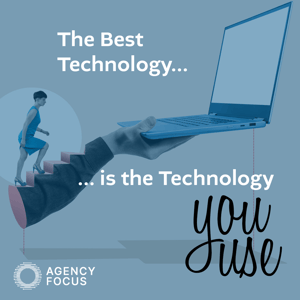I saw a post on LinkedIn today by an Agency Owner, Mike Crowley, describing how he is planning for...
The Best Technology is the Technology You Use

According to the 2022 Best Practices Study1, agencies invest anywhere from 2.5% - 3.5% of their total revenue in technology. In my experience, many of the most forward-thinking agencies are investing far more than this in their technology stack.
There is no question that technology is and will continue to make a massive impact on our industry and the way that agents of today and tomorrow serve their customers. Investing in technology for your independent agency can be a game-changer, however, it's important to have a well-thought-out plan to ensure that your investment pays off in the long run.
The right technology for your agency is the technology that you will use. Finding the technology that you will use, requires a carefully thought-out plan as well as solid execution of that plan. When you are building out your strategy for investing in technology consider implementing these steps. Otherwise, you may find that your technology investment is really just an expense inside your agency. It can only be an investment if the technology solves a problem, improves efficiency, is well-implemented, and is utilized across your entire agency. Without adoption, technology can actually have a negative impact on your agency, staff, and culture.
Here is an outline of the components of a solid plan for selecting and implementing technology inside your agency:
- Avoid the shiny-object syndrome and align technology with your business goals. Your technology investment should align with your business goals. Having a plan helps you determine what you want to achieve with your investment and how technology can help you achieve those goals. For example, if your goal is to increase customer satisfaction, investing in a customer relationship management (CRM) system could be a good option.
- Team Input & Involvement. To define the goals for the technology you need to find out what the pain points are for your team. This will help you define what the key problems are and narrow your search for solutions.
- Assess the tools you have. Often, the tools that are already implemented are not being utilized to their fullest potential. Technology is changing fast, and that includes both new technologies in the industry as well as the technologies that have been here for quite some time. Reach out to your contact at your current technology providers and review your list of needs or problems you are trying to solve. You may learn that the solution is training, not a new technology purchase.
- Budget management: A good plan helps you manage your budget effectively. By creating a roadmap for your technology investment, you can identify the costs involved and allocate resources accordingly. This can help you avoid overspending and ensure that your investment is within your budget.
- Risk management: Investing in technology can come with risks such as technical difficulties, security breaches, or integration challenges. A good plan includes a risk management strategy that identifies potential risks and outlines mitigation measures to minimize their impact.
- Prioritize needs: With so many technology options available, it can be difficult to determine which ones are essential for your business. A good plan helps you prioritize your needs and identify which technologies are most important for your business.
- Communicate & implement. To ensure that the new technology is implemented and utilized by the entire team, you need to involve them. Identify who is best to lead the implementation process, communicate expectations about key components of the change such as: the time requirements, purpose, changes needed, and most importantly what success looks like for everyone if the technology is implemented and utilized properly. One of the biggest reasons for failure in technology implementation is a lack of understanding of the purpose and impact of the change.
- Measure success: A good plan includes metrics that help you measure the success of your technology investment. By tracking key performance indicators (KPIs), you can determine if your investment is meeting your expectations and make adjustments if necessary.
Technology is not going away, and there is no question it will have a profound impact on the insurance industry as a whole. Investing in technology for your independent insurance agency can be a great way to improve efficiency, maximize productivity, and enhance the customer experience. However, to ensure that your investment pays off and protects your team and culture, it's important to have a good plan that aligns with your business goals, includes input and involvement from your team, manages your budget and risks, prioritizes your teams’ needs, is implemented and communicated well, and has a clear measurement of success.
For more information about planning for the success of your agency, visit www.agency-focus.com or contact Carey Wallace at carey@agency-focus.com.
1 – Best Practices Study as reported by IIABA and Reagan Consulting



